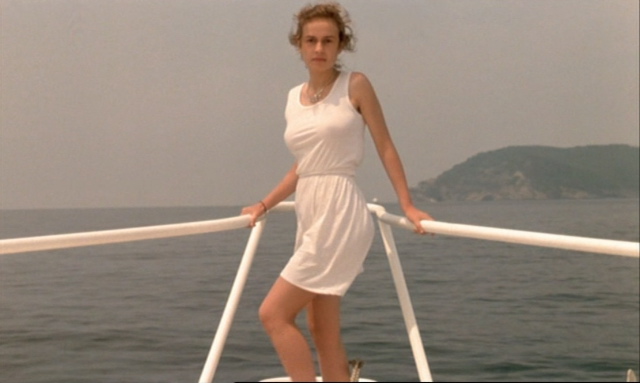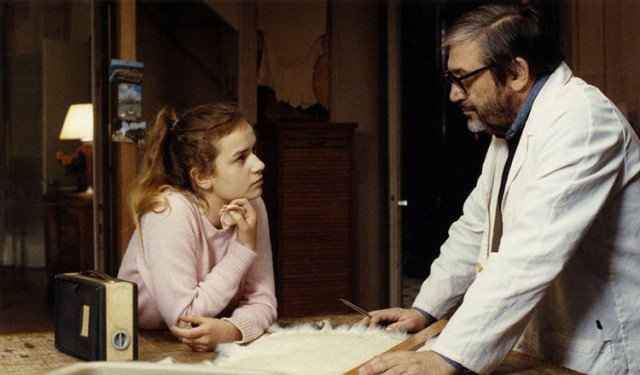
Sandrine Bonnaire makes a stunning debut as a sexually active teen in Maurice Pialat’s À NOS AMOURS
CINÉSALON: À NOS AMOURS (Maurice Pialat, 1983)
French Institute Alliance Française, Florence Gould Hall
55 East 59th St. between Madison & Park Aves.
Tuesday, September 20, $14, 4:00
Series continues Tuesdays through October 25
212-355-6100
www.fiaf.org
 Sandrine Bonnaire won the César for Most Promising Actress in her film debut, Maurice Pialat’s À nos amours, and she has more than fulfilled that promise in her still-vibrant thirty-plus-year career. Bonnaire stars as fifteen-year-old Suzanne, who suddenly becomes sexually promiscuous one summer. “‘Don’t you think one can die of love?’” she asks, rehearsing for a camp play. “‘You told me you loved me. What kind of a world is this?’” As Suzanne flits about from lover to lover, her family begins to notice a change in her and is not very happy about it. Her mother (Evelyne Ker) and father (Pialat) are on the verge of a breakup, and her creepy brother, Robert (Dominique Besnehard), doesn’t really get any of it; all three seem emotionally stunted, able only to express their feelings about Suzanne’s behavior by striking her physically. Suzanne is a decidedly contemporary Western European ingénue; the film casts no aspersions on her and does not judge her actions, even if her mother and Robert do. Bonnaire was around the same age as her character when she made the film, which contains significant nudity and bed scenes if not graphic depictions of sex; the film would likely have been wildly controversial if made in Hollywood with a fifteen-year-old American actress. Suzanne’s father, a furrier who has left his wife for another woman, is sad that she has lost one of her dimples, a sign of her maturing; when she was a baby, he wanted to protect her from kidnapping, but now he knows and accepts that he no longer has control over her life. Suzanne enjoys the sex she is having but is obviously seeking something more; but Pialat, the director of the film and who also plays the fictional father, never delves too deeply into her psyche, refusing to provide any easy answers or simplistic resolutions for this complex coming-of-age story.
Sandrine Bonnaire won the César for Most Promising Actress in her film debut, Maurice Pialat’s À nos amours, and she has more than fulfilled that promise in her still-vibrant thirty-plus-year career. Bonnaire stars as fifteen-year-old Suzanne, who suddenly becomes sexually promiscuous one summer. “‘Don’t you think one can die of love?’” she asks, rehearsing for a camp play. “‘You told me you loved me. What kind of a world is this?’” As Suzanne flits about from lover to lover, her family begins to notice a change in her and is not very happy about it. Her mother (Evelyne Ker) and father (Pialat) are on the verge of a breakup, and her creepy brother, Robert (Dominique Besnehard), doesn’t really get any of it; all three seem emotionally stunted, able only to express their feelings about Suzanne’s behavior by striking her physically. Suzanne is a decidedly contemporary Western European ingénue; the film casts no aspersions on her and does not judge her actions, even if her mother and Robert do. Bonnaire was around the same age as her character when she made the film, which contains significant nudity and bed scenes if not graphic depictions of sex; the film would likely have been wildly controversial if made in Hollywood with a fifteen-year-old American actress. Suzanne’s father, a furrier who has left his wife for another woman, is sad that she has lost one of her dimples, a sign of her maturing; when she was a baby, he wanted to protect her from kidnapping, but now he knows and accepts that he no longer has control over her life. Suzanne enjoys the sex she is having but is obviously seeking something more; but Pialat, the director of the film and who also plays the fictional father, never delves too deeply into her psyche, refusing to provide any easy answers or simplistic resolutions for this complex coming-of-age story.

Suzanne (Sandrine Bonnaire) has a complicated relationship with her father (cowriter-director Maurice Pialat) in À NOS AMOURS
It’s not even clear how much time passes between scenes and boyfriends, whose names essentially become interchangeable. Pialat wrote the incisive script with Arlette Langmann, Claude Berri’s sister; Pialat and Langmann previously collaborated on 1980’s Loulou, in which Isabelle Huppert plays a young wife who undergoes a sexual reawakening. Bonnaire, who would go on to make such films as Pialat’s Under the Son of Satan and Police, Patrice Leconte’s Monsieur Hire, Claude Chabrol’s La Cérémonie, and Régis Wargnier’s Est-Ouest, earning another six César nominations and one more win (for Agnès Varda’s Vagabond), is extraordinary in her first film. Cinematographer Jacques Loiseleux falls in love with her eyes, following them as they wander, linger, and focus with an intelligence far beyond her years, and you will too. À nos amours is screening at 4:00 on September 20 in the FIAF CinéSalon series “Beyond the Ingénue,” which continues Tuesday nights through October 25 with such other films as Céline Sciamma’s Water Lilies Éric Rohmer’s Pauline at the Beach, and Jacques Rozier’s Adieu Philippine.